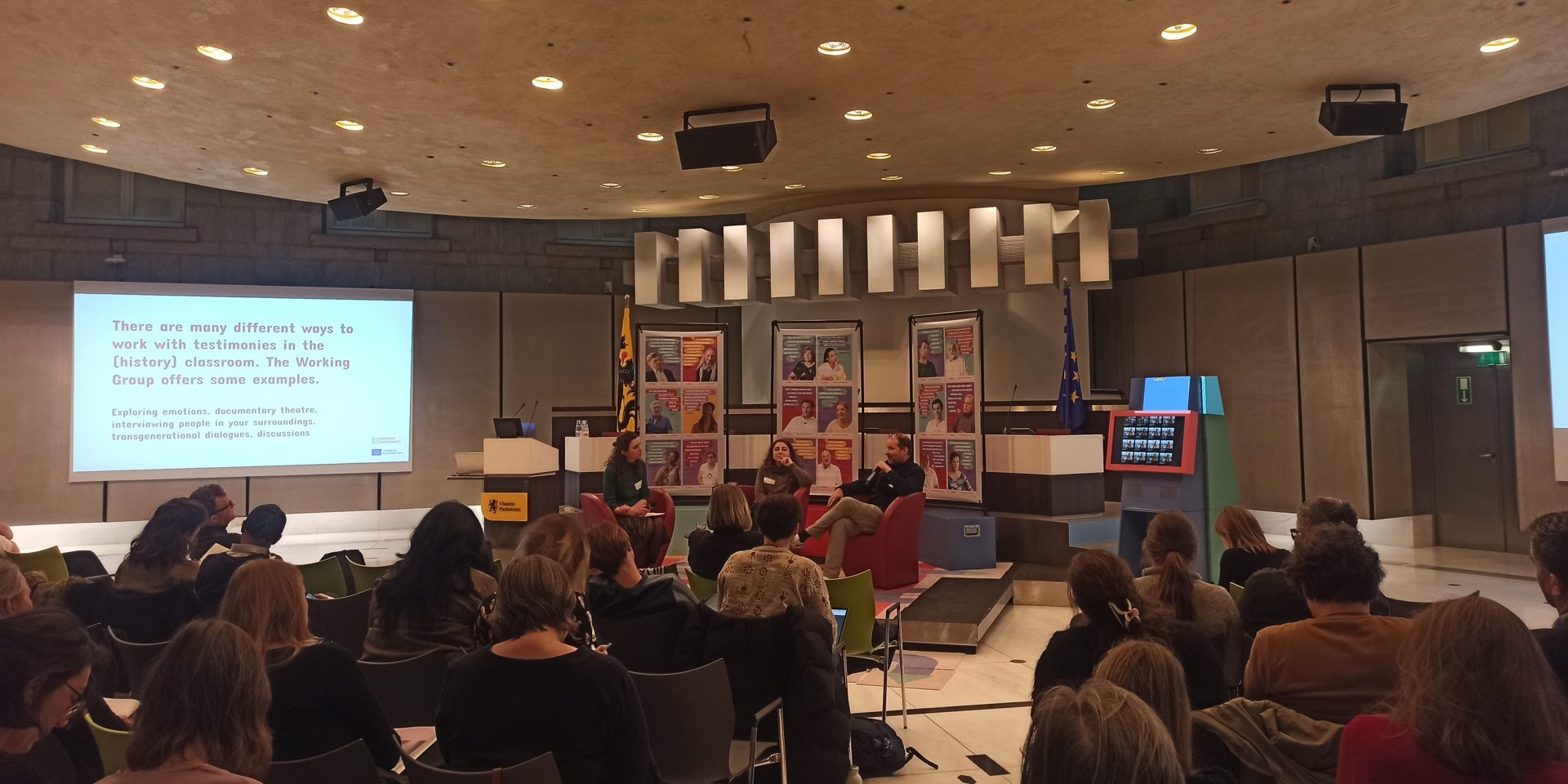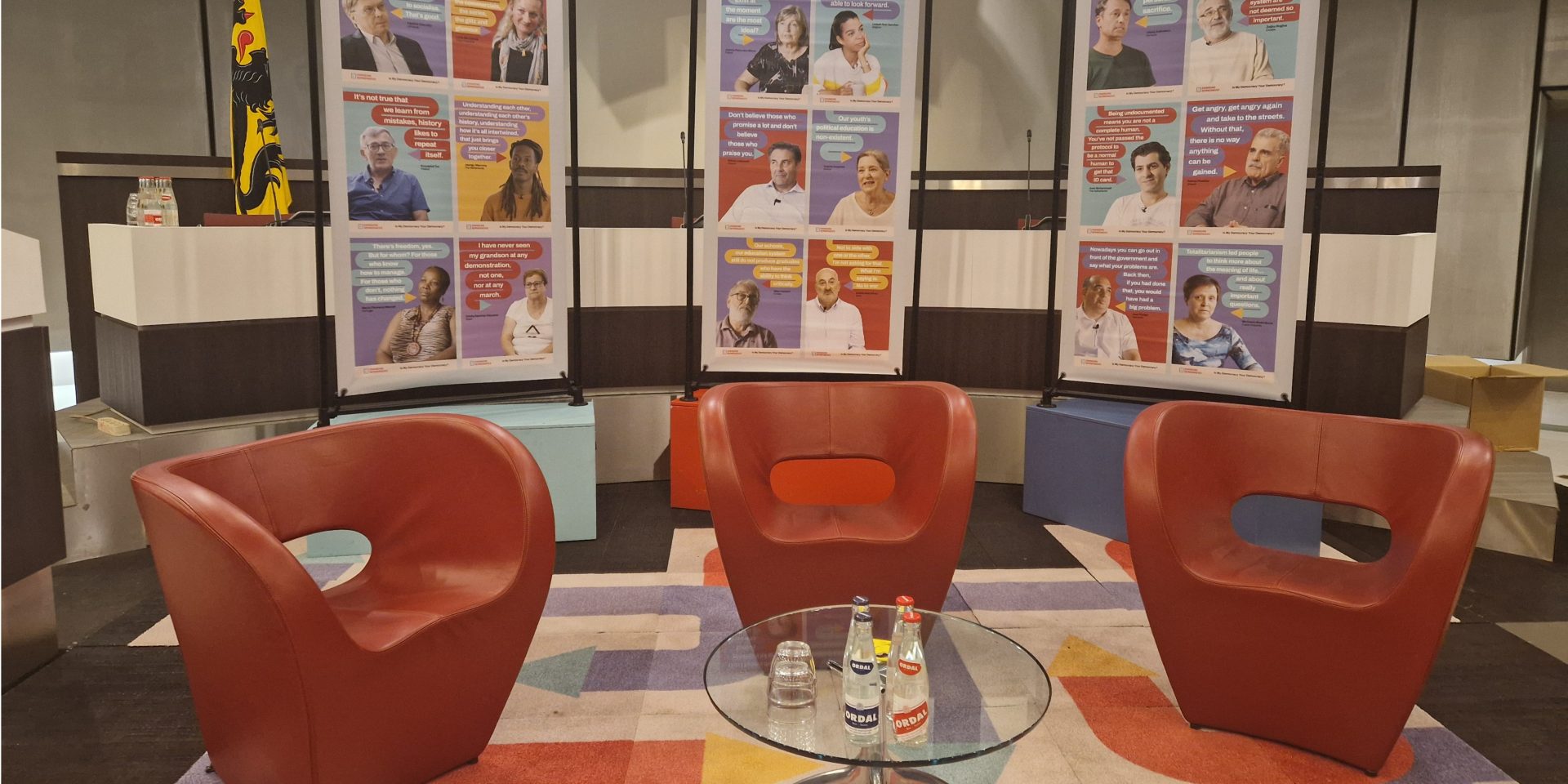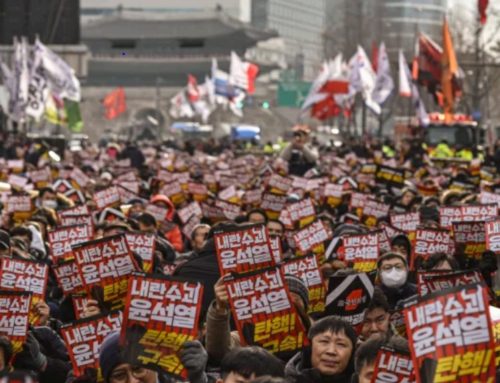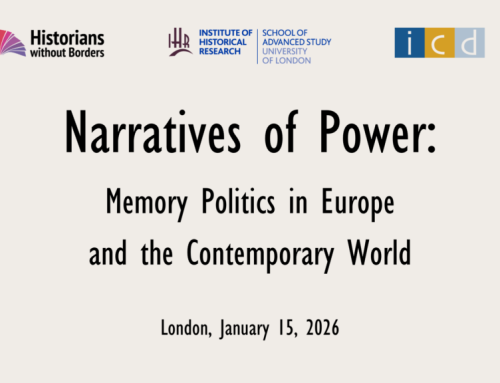Changing Democracies is a European project that involved the collection of testimonies from 31 people who shared their experiences with democratic transitions, reflecting on big picture questions and recounting daily experiences. The witnesses came from countries across Europe, including Poland, Lithuania, Romania, Greece, Croatia, Czech Republic, Spain, Portugal, Belgium, and the Netherlands. The project partners have used their stories to create educational resources, plan local experiences with students, conduct research, launch a website and create an interactive installation.
On February 7th, the Flemish Peace Institute hosted the Changing Democracies conference, titled “The Power of Testimonies for Democratic Education,” at the Flemish Parliament. The aim of the conference was to present three main outcomes of the project: the Educational Resource Pack, the interactive website and the results of the research portion of the project, which looked at how young people make meaning of democracy in several of the partner countries. Panels featuring project partners and experts delved into how these resources can be used in the classroom and explored the intersections between oral history, transnational perspectives and democratic education.
The conference began with a presentation of the Changing Democracies research publication by Maarten Van Alstein, Senior Researcher at the Flemish Peace Institute. Maarten discussed some of the conclusions of the research, which took place in Belgium, Czechia, Spain, Portugal, Poland, and The Netherlands. The researchers found that the local events were successful in engaging young people not just in historical analysis, but also in political discussions on dictatorship and democracy. These discussions around the testimonies tended to spark multiperspective modes of thinking, particularly when participants were faced with testimonies that challenged them or were familiar to them. Maarten also noted that in the local experiences, young people tended to recognise the importance of democracy, albeit in different ways. Overall, the case studies illustrate that the way oral history projects work in practice is connected to different elements of the local context, including, among other things, the memory culture of the society, the national curriculum and historical thinking skills of the participants.
This presentation was followed by a panel discussion led by Maarten and featuring Karel Van Nieuwenhuyse, Professor of History at KU Leuven, and Weronika Czyżewska-Poncyljusz, Director of International Programmes at the Borderland Foundation. Discussing what she observed during her research, Weronika mentioned that young people in Poland have been taught a hegemonic narrative about the “Solidarity” generation in their country. Through the process of conducting interviews as part of the project’s local experience, these young people were exposed to other narratives that challenged their beliefs. Reflecting on the topics of history education and oral history, Professor Van Nieuwenhuyse made a distinction between learning from history and learning with history, arguing that the present is too complex and different from the past to learn from it. Though the past cannot tell us exactly what to do, he argued, it can serve as a warning signal.
The conference continued with a presentation of the Changing Democracies website by Hanna Zielinska, Programme Curator at the Evens Foundation. Hanna began by sharing the aim of the website: to communicate nuances from historical narratives that influence our engagement with democracy. To this end, the website can be explored in three ways: through free browsing of the 400+ video fragments, watching the non-linear narratives, and watching the scroll documentary. Users, especially educators, can choose from these options depending on how they want to engage with the testimonies with their students. The scroll documentary, based on the question “Is democracy worth the trouble?”, features select fragments from the testimonies along with visuals, telling a story about democratic transition, hope and belonging.
The programme continued with a presentation of the Educational Resource Pack by Eugenie Khatschatrian, Project Manager and Operations Coordinator at EuroClio. In her presentation, Eugenie recounted the early planning stages of the resource pack, during which the working group decided on the overall aims of the educational resources. These included, among others, encouraging young people to reflect on a shared European past, challenging young people to think critically about the concept of democracy and promoting active citizenship. Eugenie continued by introducing some of the key characteristics of the resource pack, including the fact that it is designed for use in both formal and non-formal educational settings and that it includes historical context sheets for each country the witnesses come from.
The educational potential of the project’s material was further discussed in a panel moderated by Marjolein Delvou, Program Curator at the Evens Foundation and featuring Eugenie Khatschatrian and Bjorn Wansink, Professor of Education at Utrecht University. The conversation focused on the value of a transnational perspective for democratic education, illustrated by an example shared by Eugenie in which a young person participating in a local project event in Portugal was inspired to think about the impacts of Portuguese colonialism after hearing about Dutch colonialism from one of the witnesses. The conversation also featured advice on how to respond when students express sympathy toward totalitarian ideas without imposing one’s own moral beliefs in the classroom as a teacher.
The conference closed with a keynote address by Professor Hans Lauge Hansen from Aarhus University, who delved into the concept of agonistic memory which he and Professor Anna Cento Bull of the University of Bath have written about. In his speech, Professor Hansen described agonism, a multiperspective mode of remembering, as “seeing the other as an adversary in a democratic space”. Through agonistic memory practices, we can challenge prevailing narratives and integrate multiperspectivity into our understanding of present and past conflicts. Professor Hansen’s work was used as a theoretical framework for the project’s research and provides an interesting lens through which to consider young people’s engagement with democracy.
Our sincerest gratitude to Maarten Van Alstein and the Flemish Peace Institute for the organisation of this conference and thank you to all of the panelists and presenters for sharing their expertise. Visit the Changing Democracies website to explore available resources, including the Education Resource Pack and scroll documentary: changingdemocracies.eu.















